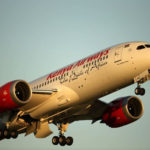Nigerian banks have advised the domestic carriers to borrow a leaf from the decision of the banking sector to engage in shared systems aimed at easing the convenience of their customers.
A communique issued at the end of a webinar organized by the Aviation Safety Round Table Initiative (ASRTI) in Lagos emphasized how the cooperative model of the banks if copied by the domestic carriers can help to facilitate the ease of the airline passengers in addressing options due to extended delays and cancellations.
The communique also revealed the willingness of the Nigerian banks to leverage on extant financial technology services to facilitate airlines’ interline arrangements to attain the ease of transactions for payment and settlement.
Participants at the webinar identified flight cancellation and the perishabililty of unused seats as important challenges to trigger interlining and code-share agreements as tools for minimizing hardship experienced by passengers and the enhancement of airlines profitability, quality of service and revenue generation.
It was acknowledged at the gathering that interline and code-share were business decisions not to be initiated by regulatory fiat even as key players noted the need for the endorsement by the NCAA as a regulatory body through the use of regulatory inducements and other strategic policies without compromising the stipulated annual economic audit on all domestic airlines to determine their state of health as Part 18 of NCAR enjoins.
The expediency for Nigeria’s aviation supervisory authorities to compliment the safety with economic will, while airlines develop the willingness to embrace technical cooperation arrangements in order to exploit the huge profitability opportunities in the regional air transport market under such agreements was also highlighted during the webinar.
The webinar recommended the emplacement of a guaranteed payment process such as Bill Settlement Plan (BSP) to enhance airlines’ cooperation while airlines embark on human capacity building for their staff on commercial agreements, negotiation, code-share, revenue management and applicable work ethics.
For Nigerian airlines to be attractive to foreign carriers for code-share and other partnerships, participants at the webinar recommended that Nigerian airline operators must be International Air Transport Association Safety Audit (IOSA) compliant, develop attractive route networks, ensure good product quality, develop the requisite commercial acumen and understand the contract terms of their engagement.
While acknowledging the fact that partnership and cooperation models work amongst airlines that consider themselves peers and whose operation are complimentary and that no single cooperation model fits it all, the domestic airlines were urged to advance cooperation models that work best for the operations such as the model being implemented by Ibom Air.
YOU SHOULD NOT MISS THESE HEADLINES FROM NIGERIAN TRIBUNE
We Have Not Had Water Supply In Months ― Abeokuta Residents
In spite of the huge investment in the water sector by the government and international organisations, water scarcity has grown to become a perennial nightmare for residents of Abeokuta, the Ogun State capital. This report x-rays the lives and experiences of residents in getting clean, potable and affordable water amidst the surge of COVID-19 cases in the state.
Selfies, video calls and Chinese documentaries: The things you’ll meet onboard Lagos-Ibadan train
The Lagos-Ibadan railway was inaugurated recently for a full paid operation by the Nigerian Railway Corporation after about a year of free test-run. Our reporter joined the train to and fro Lagos from Ibadan and tells his experience in this report…






